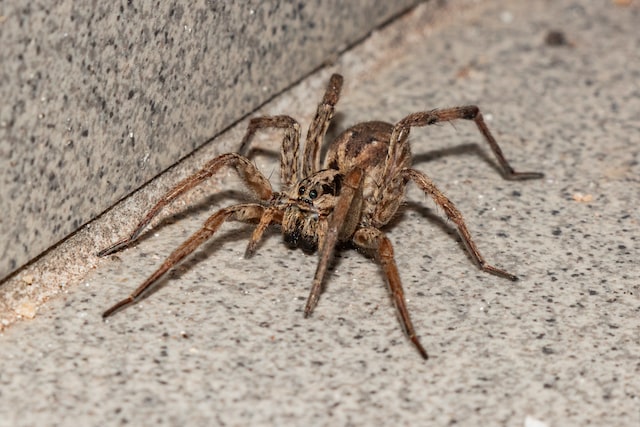
Seeking out dark and secluded spaces, spiders tend to flock to attics, crawlspaces, and basements to build their intricate webs and feast on bugs.
In North Carolina, many common basement spiders, like the black widow, brown recluse, and wolf spider, can infest your home. While solitary creatures, some species are highly venomous and can cause severe symptoms.
Trust us here at Innovative Pest Solutions to remove any invasive spiders creeping around your home. Keep reading to learn about spiders you may see in your basement this year!
Black Widow Spiders
As one of the most venomous spiders in the United States, these aren’t pests you’ll want sticking around your basement. They are easily identifiable with their sleek black shell and bright red markings adorning the underside of their abdomens.

Male black widows are a bit less flashy than their female counterparts. While females come in their signature red and black hue, male widow spiders are typically dark or light brown in color and considerably smaller.
Female black widows typically range in size from an inch to an inch and a half in length, overshadowing the tiny male black widows that are usually a few millimeters in length and size.
Like most spider species, black widows are solitary and spend their days alone on their web, waiting for an unlucky insect to crawl on board. Once mating season rolls around, a female spider will breed and eventually lay eggs.
These common basement spiders have an insidious myth connected to their deadly name too. Despite popular opinion, many black widows don’t consume their mates after breeding, at least not the species commonly found in North Carolina!
Their fearsome appearance and reputation may frighten homeowners as they populate dusty corners, attics, or basements. While their venom can make you seriously ill, they shouldn’t harm you unless bothered first.
Like most spiders, black widows tend to shy away from humans and avoid all contact unless they feel directly threatened. Most black widow bites are accidental and a result of random encounters.
You could unexpectedly brush up against a spider in its web while cleaning or reaching for a book on a long-forgotten bookshelf. If these pests slink into your clothing, shoes, or linens, they may bite when pressed against your body or crushed.
While the likelihood of an encounter is low, you shouldn’t take chances regarding these venomous pests, especially if you have children or pets. One accidental bite could lead to serious complications like illness or death.
If you’ve spotted one or more black widow spiders in your home, don’t hesitate to contact us at Innovate Pest Solutions. We’ll swiftly remove the pests to protect you and your family from painful and dangerous spider bites.
Brown Recluse Spiders
These are common basement spiders that can pack a punch!
Brown recluse spiders aren’t large, only growing up to half an inch long, but their bite can have significant and long-last effects.
Easily identifiable by their signature violin marking on their bulbous abdomens, you can discern these pests from others you may find in your home, like common house spiders and wolf spiders.
Their appearance may not send a shiver down your spine, but you should always keep an eye out for these markings when you spot a tiny brown spider lurking around your home, especially if you’re bitten.
Black widow spider bites can cause extreme illness, affecting young children and older populations the most. However, a brown recluse spider bite could leave anyone with debilitating physical symptoms and side effects.
Besides common symptoms like pain, redness, and swelling, these bites can also cause skin lesions that slowly destroy the surrounding tissue. Most recover, but it can leave your skin damaged and scared afterward.
Similar to black widows, brown recluse spiders tend to avoid human contact. They will not approach you in your home unless you threaten them or their web. Most bites are the result of accidental contact with the spider and skin.
Because they tend to nest in quiet and secluded areas, you may encounter these pests in your basement. Our basements aren’t usually heavily trafficked, so you may already share these spaces with spiders.
Look out for brown recluse spiders near your washing machine or dryer, hot water heaters, and any stored boxes you may have downstairs. Accidental contact could result in a painful and long-lasting bite.
If you’ve spotted brown recluse spiders in your basement, cellar, or other areas in or around your home, we’re here to help! Call us to remove these dangerous pests, and our trained technicians can safely do the job.
Wolf Spiders
Perhaps one of the largest common basement spiders on our list, the wolf spider is a sight to see whenever they invade your Raleigh home. As one of the biggest spiders in the United States, wolf spiders are creepy creatures you won’t want to see.
These pests can grow around two inches long, about the size of the palm of your hand. Plus, their long, gangly legs give them an extra boost when hunting for insects around your home and yard.
Because wolf spiders don’t live on webs, you’re more likely to encounter these pests out and about. They prefer to slink through your home, looking for common insects like roaches, ants, silverfish, and other spiders they may find indoors.
While their size makes them a fearsome indoor pest, they aren’t as dangerous as black widow and brown recluse spiders. Their venom isn’t medically significant unless you’re already allergic to spider venom.
But that doesn’t mean you shouldn’t take care when it comes to these pests! Their large fangs can leave you with a painful bite. Plus, because wolf spiders carry their young on their back, they could distribute dozens of tiny spiders throughout your home.
Warning! Scary spiders ahead!
Wolf spider infestations are challenging to curtail on your own. Instead, contact your local pest control agency to keep them at bay.
Eliminating Common Basement Spiders in Raleigh, NC
Unlike other pests, you can’t quickly eliminate spiders with DIY methods. Sticky traps and vinegar may help keep them away, but it’s not guaranteed to eliminate them for good.
For proven spider removal, contact us for more help!





